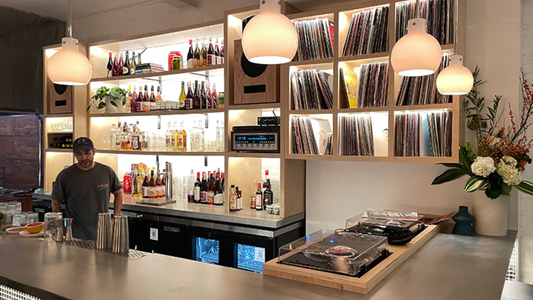
The Sound of Departure
By Rafi Mercer
It’s 5:11 in the morning, and I’m at the airport — Morocco ahead, coffee in hand, half-awake, half-dreaming. The place hums with its own strange rhythm. Not music exactly, but something close. The sound of rolling suitcases, the beeping of carts, the soft shuffle of shoes over polished floor. It’s a rhythm of anticipation — stop, go, wait, breathe, move.
Airports have always fascinated me. They’re temples of transition, full of people temporarily untethered. Nobody quite belongs; everyone’s between two worlds. And because of that, everything here seems heightened — the smells sharper, the lights a little too bright, the air full of both fatigue and possibility. You can hear it in the tone of the announcements, in the faint tension of voices at the gates, in the hiss of espresso machines. The world’s most complex rhythm section.
At this hour, sound becomes time. The early flights move slower, the voices lower, the space wider. I always find myself slipping into a kind of meditative listening here — a habit I’ve carried for years. The pauses are as important as the noises. Between the coughs, the chatter, the click of heels, there’s a hush that carries more weight than any playlist. I catch myself imagining how the place would sound through speakers — all concrete echoes and air-conditioning drones, maybe a bassline built from the low rumble of luggage trolleys.
It reminds me that rhythm isn’t confined to music; it’s everywhere. In travel, in waiting, in the space before departure. The airport at dawn is a living metronome — fast and slow at once. You can feel the BPM of human movement: tension, release, movement, pause. It’s jazz, really — organised chaos.
There’s a beauty in that if you choose to hear it. Travel is full of hidden compositions. The difference between the hum of Gatwick and the silence of Marrakech at night. The hiss of tyres on runway tarmac. The moment engines start and the whole cabin becomes one long sustained note. Those are symphonies of modern life — fragments that most people tune out, but I’ve learned to listen to them. They tell stories too.
I often think about how sound shapes emotion before we even know it. The nervous excitement before boarding. The calm relief when the plane levels out. The sense of distance made real by pressure in the ears. It’s all sensory architecture — the design of movement. And it’s why I’ll never get bored of travelling. Every journey carries its own sound design; every destination rewires how you listen.
So here I am, 5:11 am, somewhere between exhaustion and curiosity. The day hasn’t begun properly, but the world is already alive. Morocco will have its own tone — spices, sand, prayer, rhythm — but for now, I’m caught in the liminal space where everything is still becoming. Airports, for me, are like the silence before the first track starts. All potential, no melody yet.
Maybe that’s the real appeal of early travel: it teaches patience. You can’t rush the rhythm. You can only tune in, wait for the downbeat, and trust that the next movement will arrive when it’s ready.
Rafi Mercer writes about the spaces where music matters.
For more stories from Tracks & Tales, subscribe, or click here to read more.







